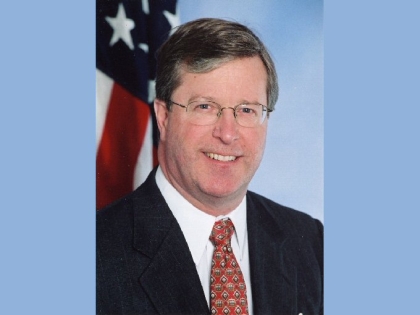
Winner: Assembly Delaying Action On Legislation To Extend Confinement Of Sexually Violent Predators

Albany, N.Y.-- "We are letting sexually violent predators out of jail, even though we know they haven't been rehabilitated and are very likely to commit sexual violence again," State Senator George H. Winner, Jr. (R-C, Elmira) said yesterday as he joined forces with Elmira native and current Westchester County District Attorney Jeanine PirroandSenate colleagues to urge Assembly action on legislation to keep sexually violent predators off the streets for longer periods of time through a process known as "civil confinement."
Pirro, a nationally reknown sex crimes prosecutor, visited the Capitolto deliver petitions containing more than 4,000 signatures in support of the legislation to Assembly Speaker Sheldon Silver. The civil confinement legislation, co-sponsored by Winner and approved with overwhelming bipartisan support earlier this year in the Senate, is backed by Governor George Pataki.
"These predators pose a serious threat to our communities, and they should be kept confined until we’re certain they’ve been treated and no longer endanger our children or anyone else," said Winner, noting that 16 states currently have laws authorizing the civil confinement of sexually violent predators.
"Shame on the Assembly," Pirro said. "Make no mistake. These people are coming out, and they're walking freely among us."
The legislation Winner co-sponsors is modeled after a state of Kansas statute which has been upheld by the United States Supreme Court. It provides a comprehensive framework for identifying, evaluating and civilly committing sexually violent predators that extends the full complement of constitutional due process protections to those against whom sexually violent predator petitions are brought. It would establish a state-level panel to conduct evaluations, including psychiatric examinations, to determine whether a sex offender about to be released from prison is a "sexually violent predator" who should remain confined. Sexually violent predators are identified as sex offenders with mental abnormalities or personality disorders that make them likely to engage in repeated acts of sexual violence. Currently in New York State there is no statutory authority to civilly confine sexually violent predators to secure facilities after they serve their criminal sentences.
Winner noted rising local concern over the dangers posed by repeat sex offenders. He pointed to a case in Yates County earlier this year where a registered Level 3 sex offender, New York’s highest level of sex offender classification, with a history of violent sex offenses, was arrestedand charged with the rape and kidnapping of a Penn Yan-area woman. The attack took place in early February while the suspect was on post-release supervision. Last month an Elmira city councilman warned of what he called an alarming influx of sex offenders moving into the city. Last week a public meeting was held in Beaver Dams, Schuyler County, to address concerns about registered sex offenders living in the community.
The Senate recently began holding public hearings on ways to strengthen the state’s decade-old Sex Offender Registration Act commonly known as "Megan’s Law." Some of the issues being examined by the Senate include lifetime registration of sex offenders; global positioning system (GPS) tracking of sexual predators; mandatory community notification to help ensure parents know when a sex offender is living in their neighborhood; and posting of information for all levels of registered sex offenders on the state Division of Criminal Justice Services (DCJS) web site. The Senate is looking to approve comprehensive legislation strengthening Megan’s Law before the end of the current legislative session in June.
There are currently 20,538 people listed on the state’s Sex Offender Registry. According to the DCJS, as of April 2005, the following number of sex offenders were registered in area counties: Chemung (141); Schuyler (31); Steuben (192); Tompkins (87); and Yates (44).
"We must have a process to identify and, if necessary, confine sexually violent predators before they’re sent back into the community," said Winner. The state-level panel created under the legislation to identify sexually violent predators would make recommendations to the state attorney general, who would then initiate court hearings to make civil commitment determinations. Sexually violent predators sentenced to civil commitment would be confined in a secure facility, separate from criminal offenders, for care, treatment and control, and reevaluated annually.
Recidivism rates for persons who commit sexually violent offenses are extraordinarily high. According to the New York State Department of Correctional Services, from 1986 through 1995, approximately 49 percent of sex offenders who were released from New York prisons were returned to prison for a violation of parole or for committing a new crime.



